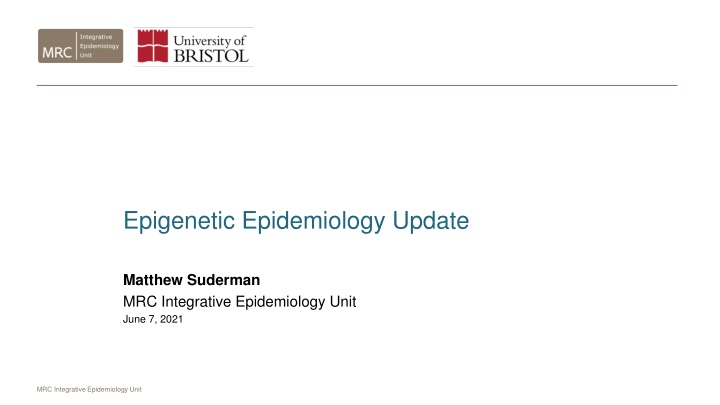
Advancements in Epigenetic Epidemiology Studies
Stay updated with the latest research in epigenetic epidemiology including studies on COVID-19 severity, disease risk factors, and exposure effects. Explore single-cell epigenetics insights into type 1 diabetes and atherosclerosis risk, offering valuable information on genetic variations and cell-type-specific chromatin profiles. Discover the intriguing connections between epigenetics and various health conditions.
Download Presentation

Please find below an Image/Link to download the presentation.
The content on the website is provided AS IS for your information and personal use only. It may not be sold, licensed, or shared on other websites without obtaining consent from the author. If you encounter any issues during the download, it is possible that the publisher has removed the file from their server.
You are allowed to download the files provided on this website for personal or commercial use, subject to the condition that they are used lawfully. All files are the property of their respective owners.
The content on the website is provided AS IS for your information and personal use only. It may not be sold, licensed, or shared on other websites without obtaining consent from the author.
E N D
Presentation Transcript
Epigenetic Epidemiology Update Matthew Suderman MRC Integrative Epidemiology Unit June 7, 2021 MRC Integrative Epidemiology Unit
EWAS of COVID-19 PMID Phenotype Tissue Study population Assocs 338673131 COVID-19 severity Blood 194 mild, 213 severe 44 340348062 COVID-19 outcome COVID-19 severity Blood 102 cases, 39 ctrls 100 cases 1505 DMRs (DMRcate) 19 DMRs 1Create EPICOVID score for predicting severity but use 44 CpG sites which were replicated in testing dataset. 2Reference first study in Discussion but make no effort to compare findings. MRC Integrative Epidemiology Unit
EWAS of risk PMID Disease Tissue Study population Assocs 34008478* Lung cancer risk Blood 208 pre-diagnostic cases, 222 ctrls 16 33980183 CVD risk Blood 83 pre-diagnostic cases, 83 matched ctrls 8 33964519 PTSD Blood 74 PTSD, 75 traumatized ctrls, 75 ctrls ? *Controlled for smoking using a DNA methylation smoking so no typical smoking CpG sites included in the 16. MRC Integrative Epidemiology Unit
EWAS of exposure PMID Exposure Tissue Study population Assocs 34044884 Sex Placenta 343 placentas 162 33990564 Coffee and tea intake Blood 15789 (15 cohorts) 11 (coffee) 33993705 Alcohol intake Blood 57 MZ twins 1* * Cpg site has never been linked to alcohol intake previously. MRC Integrative Epidemiology Unit
Single-cell epigenetics of T1D Chiou J, et al. Interpreting type 1 diabetes risk with genetics and single-cell epigenomics. Nature. 2021 May 19. 1. 2. GWAS of type 1 diabetes (n=520,850 samples) Create open chromatin profiles for individual blood and pancreas cells (snATAC-seq for 131,544 nulcei) Use snATAC-seq profiles to cluster nuclei by cell-type Test enrichment of T1D genetic variants in open chromatin by cell type - T1D variants enriched in various T cells in blood but not in pancreas immune cells! - T2D variants enriched in pancreatic endocrine, acinar, ductal cells - however, restricting to cell-type-specific open chromatin identified enrichments in pancreatic cell types like beta cells Pursue story of CFTRlocus which contains one T1D variant 3. 4. 5. MRC Integrative Epidemiology Unit
Single-cell epigenetics of Atherosclerosis rd T, et al. Single-Cell Epigenomics and Functional Fine-Mapping of Atherosclerosis GWAS Loci. Circ Res. 2021 May 24. 7,000 cells derived from human atherosclerotic lesions 5 lesional cell types identified Coronary Artery Disease associated genetic variants enriched in endothelial and smooth muscle cell-specific open chromatin We present several examples where the chromatin accessibility and gene expression could be assigned to one cell type predicting the cell type of action for CAD loci. MRC Integrative Epidemiology Unit
Omics analysis of hypertension and the kidney Eales JM, et al. Uncovering genetic mechanisms of hypertension through multi-omic analysis of the kidney. Nat Genet. 2021 May;53(5):630-637. Samples: n=430 kidneys Data: blood pressure, genotype, gene expression, alternative splicing, DNA methylation Previous GWAS of BP: 918 associations Kidney drugs: 210 drugs that target 49 Methods: cis-eQTL, sQTL and mQTL analyses Two-Sample MR to evaluate effect of BP genetic variation on related outcomes (e.g. CHD) effect of renal genes/methylation on BP MRC Integrative Epidemiology Unit
Omics analysis of hypertension and the kidney Eales JM, et al. Uncovering genetic mechanisms of hypertension through multi-omic analysis of the kidney. Nat Genet. 2021 May;53(5):630-637. Results eQTL analysis links 232/918 BP SNPs (eSNPs) to genes (eGenes) sQTL analysis links 164/918 BP SNPs (sSNPs) to gene splicing (sGenes) mQTL analysis links 357/918 BP SNPs (mSNPs) to CpG methylation (mSites) Using eSNPs, sSNPs and mSNPs as MR instruments showed slightly stronger effects than other BP SNPs for outcomes CHD and stroke but not different for other outcomes. Evidence for causal effects of 309 (e/sGenes/mSites) on BP MRC Integrative Epidemiology Unit
Aging Review of biomarkers Li X, Ploner A, Wang Y, Zhan Y, Pedersen NL, Magnusson PK, Jylh v J, H gg S. Clinical biomarkers and associations with healthspan and lifespan: Evidence from observational and genetic data. EBioMedicine. 2021 Apr;66:103318. Review of sex and aging H gg S, Jylh v J. Sex differences in biological aging with a focus on human studies. Elife. 2021 May 13;10:e63425. Skeletal muscle Sillanp E, et al. Blood and skeletal muscle ageing determined by epigenetic clocks and their associations with physical activity and functioning. Clin Epigenetics. 2021 May 17;13(1):110. Based on our results, the investigated epigenetic clocks have rather low value in estimating muscle ageing with respect to the physiological adaptations that typically occur due to ageing or PA. MRC Integrative Epidemiology Unit
Methods Buchka S, et al. On the optimistic performance evaluation of newly introduced bioinformatic methods. Genome Biol. 2021 May 11;22(1):152. "For authors to feel comfortable reporting balanced results and detailing the weaknesses of their new methods, the acceptance of nuanced pictures and open statements must increase." "the general scientific community and the journals in particular can play a positive role by acknowledging that neutral method-comparison studies are valuable research contributions" MRC Integrative Epidemiology Unit
Methods Banerjee S, et al. Tejaas: reverse regression increases power for detecting trans-eQTLs. Genome Biol. 2021 May 6;22(1):142. - Identify trans-eQTLs by testing association with all genes simultaneously using penalised regression - Identify 18,851 trans eQTLs in GTEx across 49 tissues (cf only 141 identified previously) Talukder A, Barham C, Li X, Hu H. Interpretation of deep learning in genomics and epigenomics. Brief Bioinform. 2021 May 20;22(3):bbaa177. - Describe methods for interpreting deep neural network models - Discuss how they have/can be applied in genomics and epigenomics MRC Integrative Epidemiology Unit
Protein-wide association studies (PWAS) Will be worth comparing associations of these outcomes/phenotypes with DNA methylation and DNA methylation models of protein abundance. Covid-19 Filbin MR, et al. Longitudinal proteomic analysis of severe COVID-19 reveals survival- associated signatures, tissue-specific cell death, and cell-cell interactions. Cell Rep Med. 2021 May 18;2(5):100287. Metabolic syndrome Elhadad MA, et al. Metabolic syndrome and the plasma proteome: from association to causation. Cardiovasc Diabetol. 2021 May 20;20(1):111. Cardiorespiratory fitness Robbins JM, et al. Human plasma proteomic profiles indicative of cardiorespiratory fitness. Nat Metab. 2021 May 27. MRC Integrative Epidemiology Unit






















